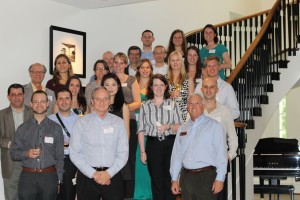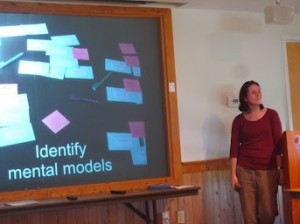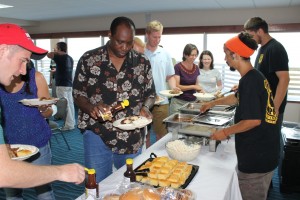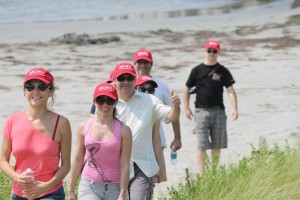
Hiking up the beach on the Outer Banks as part of a visit to Oregon Inlet, where participants heard form engineers and geologists about the future of bridges and roads with sea-level rise and higher storm surges.
What do doctoral students studying psychology, meteorology, law, wildlife, engineering, economics, forestry and public health have in common? A lot, it seems, based on the recent experience of 15 doctoral students—5 each from NC State, the University of Surrey in England and the University of Sao Paulo in Brazil—who spent nine days together studying the topic of climate change. They participated in the inaugural Interdisciplinary Doctoral Seminar sponsored by the University Global Partnership Network, of which NC State is a founding member.
The seminar was organized and led by Larry Nielsen and Sarah Slover of the Department of Forestry and Environmental Resources on behalf of the NC State’s Office of International Affairs. “I have continued to work on these partnerships since returning to the faculty,” said Nielsen, former dean and provost, “and this has been the most rewarding experience so far.”
The goal of the interdisciplinary seminars is to bring breadth to the understanding of an important global topic that is being studied in depth by the doctoral students. NC State was the ideal host for the first seminar on climate change. Students and faculty from the
three schools spent their first two days on our campus, studying the global context of climate change relating to food security, water resources and public health and the science of climate modeling—and enjoying a dinner with Chancellor Woodson at The Point.
They then traveled east for three days immersed in one of the nation’s regions most vulnerable to climate change—the Outer Banks. Students met with faculty of the UNC Coastal Studies Institute, scientists from the US Army Corps of Engineers and Nags Head town officials and residents to understand the meaning of climate change to local communities. The seminar concluded in Washington, DC, where students held discussions with climate change experts from the U.S., U.K. and Brazilian governments, advocacy organizations, think-tanks and leading universities. The final morning was an extended comprehensive discussion with Victoria Arroyo, Executive Director of the Georgetown University Center for Climate Resources. “It was a unique opportunity for us to see how other regions and countries are working diligently to solve a world challenge,” commented Laurie Gharis, doctoral student in Forestry and Environmental Resources at NC State.
“It was unlike any seminar I’ve ever participated in,” said Sarah Fritts, doctoral student in the Fisheries, Wildlife, and Conservation Biology program at NC State. “Honestly, I did not feel like a student. I was, of course, learning every step of the way, but I was treated as a professional.” Students also appreciated the opportunity to learn about the topic in a much broader context than their disciplinary research allows. One student participant stated, “My research is more oriented to policy and regulatory analysis for climate change, so I enjoyed having more technical discussions to broaden my understanding about the problem.” Students in technical fields expressed the same view about learning more policy, sociology and economics regarding climate change. Participants also especially liked the chance to get to the coast to see climate change impacts personally.
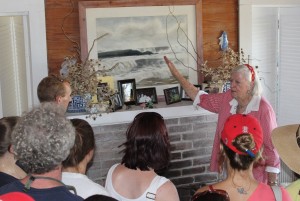
Seminar participants were guests at the historic beach home of Ms. Nancy Rascoe, long-time resident of Nags Head.
“This was an outstanding opportunity to meet and interact with a terrific collection of experts and informed officials from the local, state, national and international level,” reflected Brian Bulla, participant and Forestry and Environmental Resources doctoral student. But the students’ favorite part of the seminar seemed to be meeting colleagues from other universities, disciplines and nations. “The benefits I gained by participating will extend for some time through the professional and personal contacts I made during the program,” said Bulla.
“We may have been lucky this time,” said Nielsen, “but this great group of students formed an immediate bond—a bond I’m sure will continue through time. They’ve already started Facebook pages and other means to stay in touch.”

Wildlife doctoral student Sarah Fritts plays a historical lute for her colleagues at the historic Gadsby’s Tavern in Alexandria.


